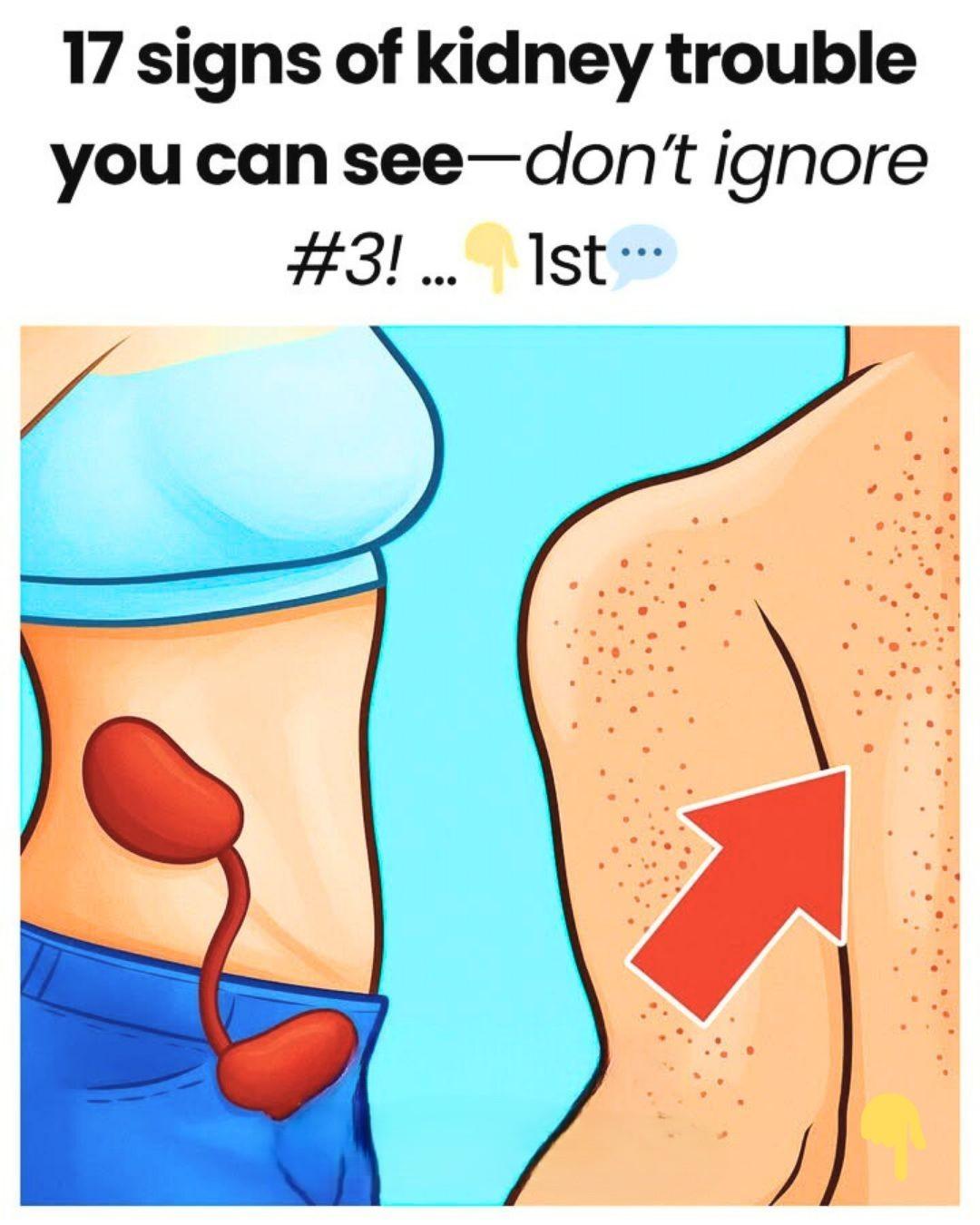| # | Possible Sign / Symptom | What It Could Mean |
|---|---|---|
| 1 | Foamy or bubbly urine (lots of persistent bubbles) | Could indicate protein leaking from the blood into urine — a key sign of kidney filter damage. National Kidney Foundation+2Labcorp+2 |
| 2 | Blood in urine (pink, red, or dark urine) | Damaged kidney filters or urinary tract issues may let blood cells leak into urine. National Kidney Foundation+2Mayo Clinic+2 |
| 3 | Frequent urination, especially at night | Kidneys failing to concentrate urine properly may cause increased urination — even when not much fluid intake. National Kidney Foundation+2Cleveland Clinic+2 |
| 4 | Swelling in ankles, feet, hands (fluid retention) | Poor kidney filtration may lead to fluid build-up in tissues. nhs.uk+2Cleveland Clinic+2 |
| 5 | Puffiness around eyes (especially in morning) | Fluid and protein imbalance may cause puffiness or swelling — a subtle early clue. National Kidney Foundation+1 |
| 6 | Persistent fatigue, weakness or low energy | Kidneys not filtering properly means waste builds up — can cause tiredness, anemia, and poor concentration. Mayo Clinic+2WebMD+2 |
| 7 | Poor appetite, nausea, or vomiting | Build-up of wastes can interfere with digestion and appetite. Mayo Clinic+2Cleveland Clinic+2 |
| 8 | Itchy or dry skin | Electrolyte imbalance and waste build-up may irritate skin. Mayo Clinic+2Wikipédia+2 |
| 9 | Muscle cramps or cramps in legs | Electrolyte or mineral balance disruptions can lead to cramping. Cleveland Clinic+1 |
| 10 | Trouble sleeping or insomnia | Imbalances and waste accumulation may disrupt sleep. Mayo Clinic+1 |
| 11 | Shortness of breath or breathlessness | Fluid retention or anemia from kidney issues may make breathing harder. Mayo Clinic+1 |
| 12 | Darkened, pale, or unusual skin tone and dry skin changes | Waste build-up may cause skin discoloration or dryness. Cleveland Clinic+2nhs.uk+2 |
| 13 | High blood pressure that’s hard to control | Kidneys play a key role in regulating blood pressure — damage can destabilize it. nhs.uk+1 |
| 14 | Trouble concentrating or “brain fog” | Waste buildup and poor filtration can impair cognitive performance. Cleveland Clinic+2Cleveland Clinic+2 |
| 15 | Less urine production than usual (sudden drop) | Could signal acute kidney injury — needs immediate attention. Healthdirect+1 |
| 16 | Nausea or persistent queasiness | Waste accumulation can upset digestion and general well‑being. Mayo Clinic+1 |
| 17 | Unexplained swelling, puffiness or fluid retention (anywhere — ankles, legs, face) | A sign kidneys can’t properly regulate fluid and waste, causing retention. Cleveland Clinic+2Mayo Clinic+2 |
“Many people with kidney disease have no symptoms at all. Others may notice mild symptoms that are easy to ignore.” nhs.uk+1
🩺 When to See a Doctor — and What to Ask
🔹 Consider a check‑up if you experience:
-
More than one of the above signs, especially for a few weeks.
-
Changes in urine (color, smell, amount, frequency), persistent swelling, or abnormal fatigue.
-
Risk factors such as high blood pressure, diabetes, heart disease or a family history of kidney problems. Cleveland Clinic+2nhs.uk+2
🔹 What your doctor may do:
-
Order blood work to check kidney function (eGFR, creatinine)
-
Check urine (to detect proteinuria or blood)
-
Monitor blood pressure and fluid balance
-
Recommend lifestyle changes or medication if needed
Early detection — when decline is small or just starting — offers the best chance to slow progression. American Kidney Fund+2nhs.uk+2
🩹 How to Support Kidney Health (Proactive Measures)
Even before any symptoms, there are proven ways to keep your kidneys healthy or protect them if you’re at risk:
-
Manage blood pressure and blood sugar (especially if you have hypertension or diabetes) — top causes of chronic kidney disease (CKD). nhs.uk+2Mayo Clinic+2
-
Limit excessive use of NSAIDs or pain‑relievers — long‑term heavy use can strain kidneys. nhs.uk+1
-
Stay hydrated, eat a balanced diet low in excessive sodium and processed foods
-
Regular check‑ups, especially if you have risk factors (age, heart disease, high BP, diabetes, family history)
⚠️ Keep in Mind
-
Not all kidney conditions show obvious signs. In fact, many people live with declining kidney function for years before any symptoms. American Kidney Fund+2kidney.ca+2
-
Symptoms like fatigue, itching, or swelling may overlap with many other conditions — but that doesn’t mean you should ignore them.
-
A single sign alone often doesn’t indicate a problem — but patterns and changes over time matter.
📌 Final Thoughts
Your kidneys don’t shout when they’re in trouble — sometimes they whisper. Paying attention to persistent, unusual changes in your body — especially those involving urine changes, swelling, fatigue, or skin/skin‑related shifts — can help you catch kidney issues early when there’s a better chance to act.
If you notice any of the signs listed — especially more than one — it’s wise to speak with your healthcare provider. Early tests are simple and can help protect your kidneys for the long run.

